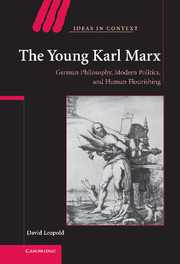Chapter 4 - Human flourishing
Published online by Cambridge University Press: 22 September 2009
Summary
In the early writings, Marx contrasts ‘political emancipation’ with what he calls ‘human emancipation’. This comparison has two central elements: political emancipation is flawed but extant, whilst human emancipation, although it avoids the ‘incompleteness and contradiction’ of its political counterpart, is not yet realised in the world.
The unrealised character of human emancipation underpins many of the interpretative difficulties with which the present chapter wrestles. That the young Marx was less certain of the social and political arrangements of the future than of the lineaments of the contemporary world is scarcely surprising. That, in the absence of such certainty, he offered so little by way of clear or considered speculation is rather more remarkable. (Clear and careful reflection is not, of course, incompatible with what is sometimes called ‘ideal theory’ – that is, theory concerned with questions of institutional design in a society which does not suffer from scarcity, injustice, and so on.) Even measured by the standards of the early writings, Marx's account of human emancipation is abbreviated and opaque.
The final two chapters of this book pursue two closely related tasks. In the present chapter, I outline the young Marx's vision of human emancipation, attempting, in particular, to flesh out its elusive political dimension. In the following (and final) chapter, I examine the rationale for Marx's considered reluctance to say more about the contours of the society of the future.
- Type
- Chapter
- Information
- The Young Karl MarxGerman Philosophy, Modern Politics, and Human Flourishing, pp. 183 - 278Publisher: Cambridge University PressPrint publication year: 2007
- 1
- Cited by

